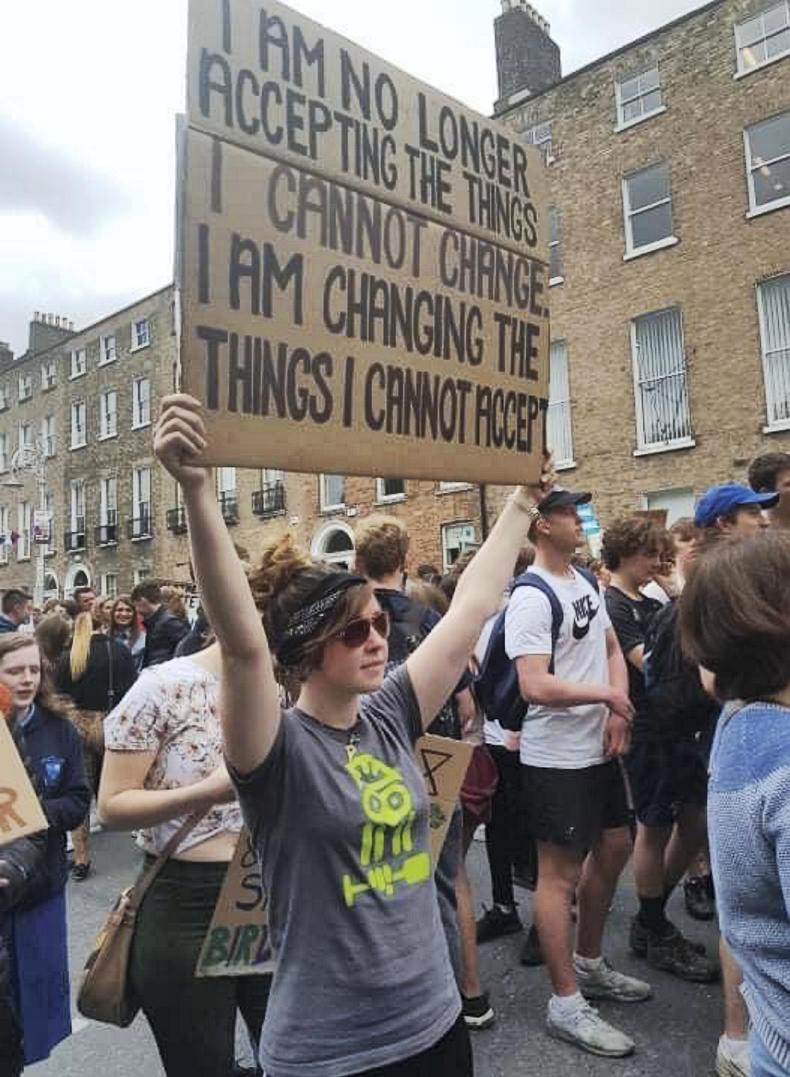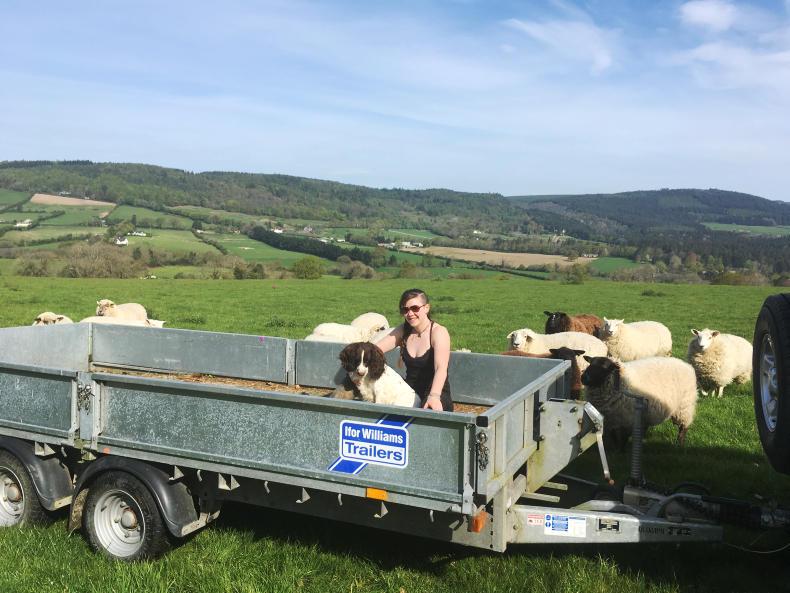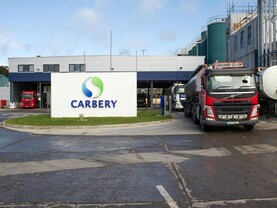The Extinction Rebellion (XR) is a loosely structured organisation with followers in many developed countries, including the Netherlands, the UK, Australia, South Africa, Canada and Switzerland, to name just a few.
Conditions of membership include a commitment to adhere to non-violent protests, as well as an openness to learn, avoid blaming individuals for climate change, but to look for decentralisation.
Truth
It says it is demanding governments to tell the truth about the ecological crisis, zero emissions drawdown by 2025 and participatory democracy.
The group led 10 days of protests in London in April this year, blocking the streets and leading to hundreds of arrests.
The 16-year-old Swedish climate activist Greta Thunberg, who started the ‘school strike for climate’ movement, addressed the protest in London.
So what does the Extinction Rebellion group look like in Ireland?
The Irish Farmers Journal met up with XR member Jayne Stephens, who hails from a beef and sheep farm in Ashford, Co Wicklow, and works full-time researching bathing water quality in Dublin Bay with UCD.
Jayne is also in the middle of her Green Certificate studies.
“My idea would be to get some farmers or sustainable farming talkers to the Dublin group to educate them [about agriculture],” said Jayne. While the Dublin group started by meeting in cafés, it is now moving to larger venues to accommodate numbers.
“There’s people from every background there, there’s men in suits, little kids, it’s across the scale,” said Jayne, who has participated in marches outside Leinster House with the group.
“Going to these marches is pretty overwhelming.
"One minute you are furious with the Government that they are not doing enough… the next you’re nearly in tears.
"Everybody is really scared, because 10 years from now, if things don’t change, I won’t be able to have kids, ethically.
"The seas are going to rise, the storms are going to get more extreme, people are going to have to head upland. It’s really scary.”

While acknowledging work being carried out by the Irish Government to address climate change, Jayne says the Extinction Rebellion group wants it to happen faster.
She said that Ireland should be more than 70% sufficient in renewable energy by 2030 and that barriers to on-farm renewables need to be stripped down.
“Ireland is behind in the race. Irish schools are still being fitted with gas boilers and have to apply for planning permission if they want to build a solar panel.
"The same could be said for farm buildings; huge big shed roofs and I know farmers would love to make money selling energy back to the grid, but they can’t,” said Jayne.
On the home farm, she would “like to see it profitable".
"We are constantly fighting the poor prices we get in the factories. What I would like to see the Government put in action is a tax of some sort on foreign meats coming in.
"That would get people to eat local produce. If it’s coming from far afield, it should have an air mile tax on it, same with avocados.”

Jayne Stephens at the gates of Leinster House
“Irish farmers are very resilient, very productive people. We are producing enough for the country, we are just not being paid enough for it.
"The Irish farming community are the ultimate caretakers of the land and XR recognises that a drastic change to Ireland's relationship with the climate has to be driven by us [farmers]."
Jayne is calling on other industry sectors to take note of the progress Irish agriculture has made in terms of carbon efficiency.
“People talk about cows - they need to look at cars and planes,” she said. “Everything needs to be put on hold until we sort out our climate, this is the priority now.”
Read more
Renewable heat scheme to benefit forestry
Listen: replanting obligation and red tape raised as barriers to afforestation
Environment: solar panels specifications for TAMS II published
The Extinction Rebellion (XR) is a loosely structured organisation with followers in many developed countries, including the Netherlands, the UK, Australia, South Africa, Canada and Switzerland, to name just a few.
Conditions of membership include a commitment to adhere to non-violent protests, as well as an openness to learn, avoid blaming individuals for climate change, but to look for decentralisation.
Truth
It says it is demanding governments to tell the truth about the ecological crisis, zero emissions drawdown by 2025 and participatory democracy.
The group led 10 days of protests in London in April this year, blocking the streets and leading to hundreds of arrests.
The 16-year-old Swedish climate activist Greta Thunberg, who started the ‘school strike for climate’ movement, addressed the protest in London.
So what does the Extinction Rebellion group look like in Ireland?
The Irish Farmers Journal met up with XR member Jayne Stephens, who hails from a beef and sheep farm in Ashford, Co Wicklow, and works full-time researching bathing water quality in Dublin Bay with UCD.
Jayne is also in the middle of her Green Certificate studies.
“My idea would be to get some farmers or sustainable farming talkers to the Dublin group to educate them [about agriculture],” said Jayne. While the Dublin group started by meeting in cafés, it is now moving to larger venues to accommodate numbers.
“There’s people from every background there, there’s men in suits, little kids, it’s across the scale,” said Jayne, who has participated in marches outside Leinster House with the group.
“Going to these marches is pretty overwhelming.
"One minute you are furious with the Government that they are not doing enough… the next you’re nearly in tears.
"Everybody is really scared, because 10 years from now, if things don’t change, I won’t be able to have kids, ethically.
"The seas are going to rise, the storms are going to get more extreme, people are going to have to head upland. It’s really scary.”

While acknowledging work being carried out by the Irish Government to address climate change, Jayne says the Extinction Rebellion group wants it to happen faster.
She said that Ireland should be more than 70% sufficient in renewable energy by 2030 and that barriers to on-farm renewables need to be stripped down.
“Ireland is behind in the race. Irish schools are still being fitted with gas boilers and have to apply for planning permission if they want to build a solar panel.
"The same could be said for farm buildings; huge big shed roofs and I know farmers would love to make money selling energy back to the grid, but they can’t,” said Jayne.
On the home farm, she would “like to see it profitable".
"We are constantly fighting the poor prices we get in the factories. What I would like to see the Government put in action is a tax of some sort on foreign meats coming in.
"That would get people to eat local produce. If it’s coming from far afield, it should have an air mile tax on it, same with avocados.”

Jayne Stephens at the gates of Leinster House
“Irish farmers are very resilient, very productive people. We are producing enough for the country, we are just not being paid enough for it.
"The Irish farming community are the ultimate caretakers of the land and XR recognises that a drastic change to Ireland's relationship with the climate has to be driven by us [farmers]."
Jayne is calling on other industry sectors to take note of the progress Irish agriculture has made in terms of carbon efficiency.
“People talk about cows - they need to look at cars and planes,” she said. “Everything needs to be put on hold until we sort out our climate, this is the priority now.”
Read more
Renewable heat scheme to benefit forestry
Listen: replanting obligation and red tape raised as barriers to afforestation
Environment: solar panels specifications for TAMS II published








 This is a subscriber-only article
This is a subscriber-only article









SHARING OPTIONS: